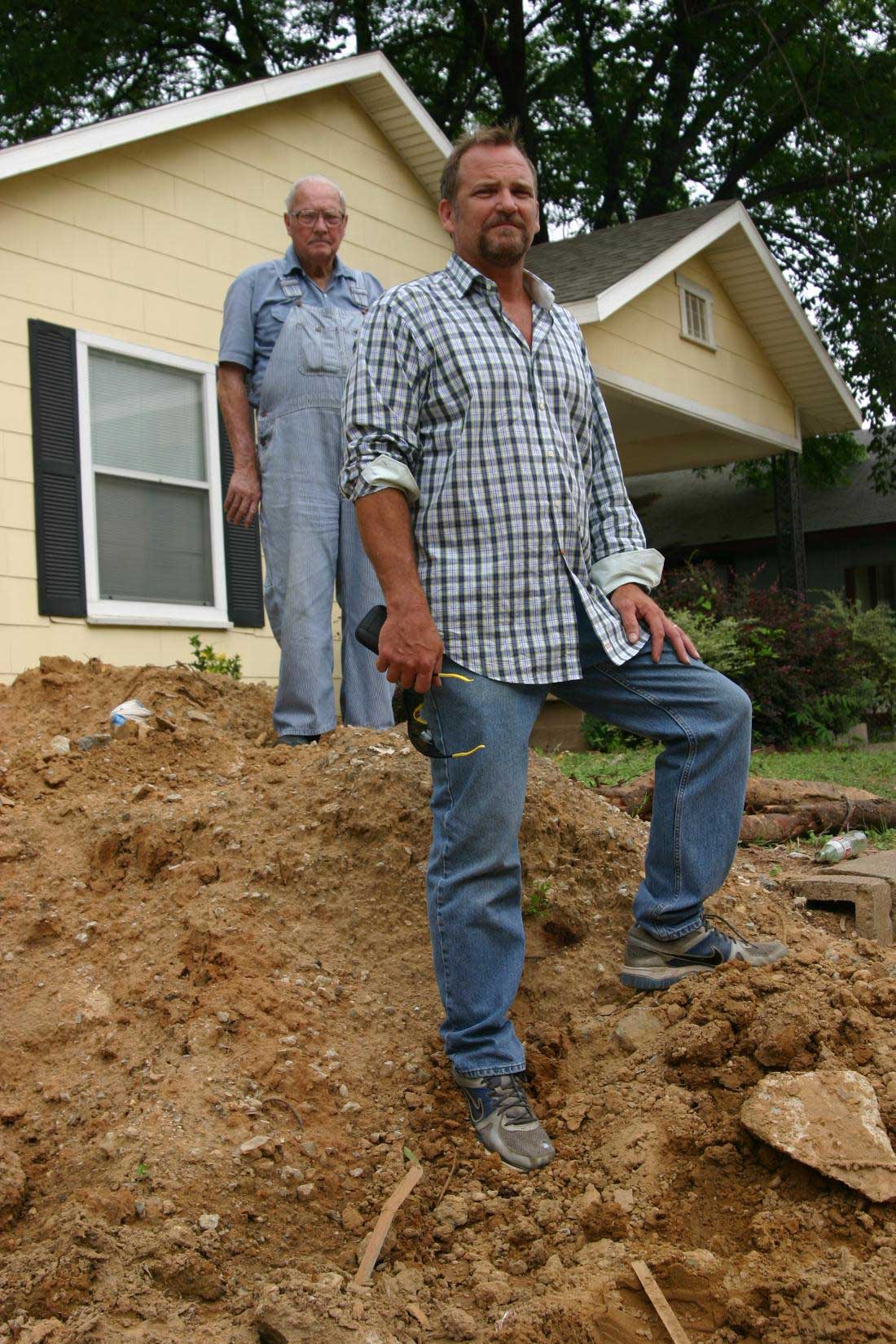Nobody knows how old the American elm at the corner of Murphy Street and Cleckler Avenue was, but it was mammoth and regal. The tree provided a blanket of shade for the small frame house underneath it. Neighbors had enjoyed the green canopy for decades.
“It was the prettiest tree on the street,” said Leticia Sanchez, who lives nearby. “I was surprised they knocked it down.”
The tree’s owner, Brian Bentley, was even more surprised. He owns the house at 901 Cleckler Ave. and has rented it to the same couple for 10 years. The city has been installing a new street, curbs, and sidewalks in the neighborhood for the past year or so.
On Dec. 6, Bentley and a friend were driving near the house when he noticed a street crew had blocked access to Cleckler while men with chainsaws were destroying the tree.
Bentley and his friend, Robert Chesser, a retired Fort Worth police officer, tried to stop the crew but were told to stay back while the work was being done. Before the final cut was made, however, Bentley grabbed a tape measure and determined the trunk’s circumference — 106 inches. He took photos as proof.
The Bentleys know their stuff when it comes to the workings of city crews, codes, and bureaucracies. The house is located in the Carter-Riverside neighborhood, where Bentley and his wife, Lancine, were founding members of the Carter-Riverside Neighborhood Association. Lancine was the group’s first president. Bentley has served on various city commissions, including the Fort Worth Board of Adjustment. The couple now live in Denton, where Bentley is a member of that city’s planning and zoning commission and tree preservation committee. Lancine is program manager of Denton’s Code Enforcement Division.
The City of Fort Worth had hired a contractor to do street work, and those workers came onto Bentley’s property and cut down his tree without a permit. By his estimation, the city ignored its own tree ordinance and cut down a so-called “significant” tree, meaning it was of a size and location that requires a permit for removal.
He figures the city should compensate him based on numbers found in its own ordinance — $400 per inch of diameter, or $13,496.
Doing the math was easier than collecting the money.
Bentley, who does not hear well, prefers to communicate by text or e-mail, so on Dec. 11 he sent an e-mail to city council member Danny Scarth and city forester Melinda Adams to report the damage. He asked if the city was exempt from its own ordinance and asked whether he would be compensated.
On Jan. 4, Adams told him that she hadn’t issued a permit to remove the tree.
That same day, Scarth e-mailed Andy Anderson, assistant director of Transportation and Public Works, asking for an update. Anderson’s reply stated that the tree’s roots were damaged when workers removed the original street pavement, and that Adams “indicated to us that, with that much tree damage, the tree would likely not survive.” Also, a “construction inspector” determined the tree to be in poor health. Lastly, the resident at the home “was accepting of the tree removal,” Anderson wrote
Bentley shot down every excuse. On Jan. 7, he responded with an e-mail explaining that the city ordinance requires root protection when working around significant trees. The ordinance also calls for a city arborist rather than a street construction inspector to determine a tree’s health. Lastly, the ordinance required permission from the homeowner to remove the tree. In this case, the street contractor spoke only with the tenant.
One of the tenants, Lupe Amaya, was at the house when the contractor knocked on the door that day to ask about removing the tree. Amaya doesn’t speak English, and she called her husband, Joe Rosas, to talk to the contractors.
“They said they had to cut it,” Rosas recalled.
He thought the workers had a permit, he said.
“I said OK,” he said.
Bentley wrote to Adams and Scarth multiple times and also e-mailed City Manager Tom Higgins, and Mayor Betsy Price.
On Feb. 4, Anderson sent an apologetic e-mail to Bentley, saying the decision to cut down the tree was based on a “good faith review and analysis of the situation in the field and information presented by the resident.” The construction inspector who allowed the tree’s removal was “counseled.” City officials were also “re-emphasizing” that staff members determine property ownership before making decisions involving private property.
Lastly, Anderson offered to plant two 3-inch-diameter trees as replacements. He offered Bentley a choice between several different kinds of trees and closed the e-mail by saying Bentley would need to sign a release against any further liability for the city.
Bentley didn’t take the bait. The city is insured, as are its contractors, Bentley responded. He believes he is owed the full $13,496.
He ended the e-mail with a simple question; “Is the city exempt from their own rules?”
Weeks went by, but he heard no more from Anderson or anyone else at city hall. On April 12, he e-mailed Anderson and said, “I deserve and demand to be treated better than this.”
No response.
In mid-May, a frustrated Bentley asked Fort Worth Weekly for help. The paper called city hall on May 23 and spoke with communications officer Bill Begley, who said he would look into the situation.
That same day, Anderson sent an e-mail to Bentley apologizing for the length of time it had taken him to respond. The city was still looking into the matter, he said.
Bentley said he expected the city to follow the same rules that it imposes on residents. The tree ordinance determines the monetary values of trees.
“I want nothing more or less than what the law calls for,” he wrote. “If the city was citing me for violating the same ordinances, what would the city expect?”
Evidence of the tree is now gone, other than a few exposed roots. Workers ground the stump down and covered it with dirt.
Bentley looked over the damage on a recent morning and took a trip down memory lane. The Bentleys bought the house in 1998, after it had sat vacant for eight years. Vandals and lack of maintenance meant it needed to be stripped down to the studs and rebuilt from scratch. Bentley recalled the hoops he had to jump through to please city inspectors. For instance, an inspector told him to remove a window that had already been installed and to replace it with one that was three inches longer.
“They give you grief, but then the city can violate its own ordinances,” he said.
City officials say half the tree’s trunk was in the city’s right-of-way and that the tree’s damaged roots, which ran underneath city property, had doomed the tree’s health. The city is sticking with its offer of two small trees installed on the property by a private landscaping company.
Bentley disputes that the tree was in the city’s right of way.
The dispute is a common one in the bustling Metroplex, where infrastructure improvements often clash with existing green space, said Janette Monear, president of the Texas Trees Foundation, a group devoted to beautifying public streets and rights-of-way by planting trees.
Bentley’s American elm is desirable in urban areas because elms can filter more carbon and particulates than other trees, she said. However, cutting roots on one side of a tree can destabilize it, particularly during high winds.
“It’s appropriate to take down a tree like that,” Monear said. “You don’t want it to come down on a home.”
Bentley agrees the damaged roots might have eventually killed the tree, but he expects the city to own up to its mistake — and pay accordingly.













I hope mr. bently gets his due; but, in a working capacity and an involuntary resident (tarrant county stole my neighborhood from denton county) I have dealt with the city of fort worth code enforcement. there is no question they are an organized bunch compensated to be narrow minded, hypocritical, and cheat whenever possible.
This is bull shit! The city of Fort Worth is acting like a little kid Own up to your mistake and pay the man for the damage yall caused his property! Your lucky he is being nice and hasn’t sued yet!
Mayor Price has said “This is YOUR Ft. Worth-speak up”. Was she too busy to offer any solutions to this problem?
Citizens, please protect our green spaces if we don’t who will? What good is progress if we
destroy Gods creation to the point it is no longer recognizable! City council members
for shame!